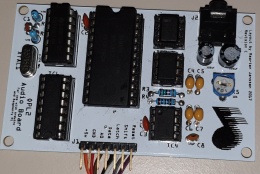ESP OPL: Difference between revisions
Jump to navigation
Jump to search
No edit summary |
No edit summary |
||
| Line 23: | Line 23: | ||
== To-do == | == To-do == | ||
* Replace the LM386 (op-amp) with a new one as the current one seems to be broken. | * <s>Replace the LM386 (op-amp) with a new one as the current one seems to be broken.</s> New ones ordered from France | ||
* Perhaps place everything on a PCB? | * Perhaps place everything on a PCB? | ||
* Look into adding a cap between VCC and GND to get rid of some hum | * Look into adding a cap between VCC and GND to get rid of some hum | ||
Revision as of 12:59, 15 August 2019
| melan | |
|---|---|
| Participants | Melan |
| Skills | Arduino, Programming, Python |
| Status | Production |
| Niche | Music |
| Purpose | Fun |
| Tool | No |
| Location | |
| Cost | |
| Tool category | Electronics |
Opl2 board.jpg {{#if:No | [[Tool Owner::{{{ProjectParticipants}}} | }} {{#if:No | [[Tool Cost::{{{Cost}}} | }}
Intro
I still have a OPL2 board laying around that I wasn't using for anything at all. Dreamer came up with the idea of using it as a theme song player for when members enter the space. Of course, it has to be IoT.
OPL2
The OPL2 is a FM-synthesizer created by Yamaha, and was widely used in a lot of sound cards and several arcade games. It has 9 channels, or 6 channels when you are using the 5 percussion instruments. The chip has a characteristic sound due to how it produces the waveform.
For more information on the chip, check out the Wikipedia article.
Using
- ESP8266 (Wemos D1 mini)
- OPL2 Audio Board
To-do
Replace the LM386 (op-amp) with a new one as the current one seems to be broken.New ones ordered from France- Perhaps place everything on a PCB?
- Look into adding a cap between VCC and GND to get rid of some hum
- Write a UDP protocol for directly interfacing with the registers of the synth (So it can actually play DRO)
Code (git)
SOON.
